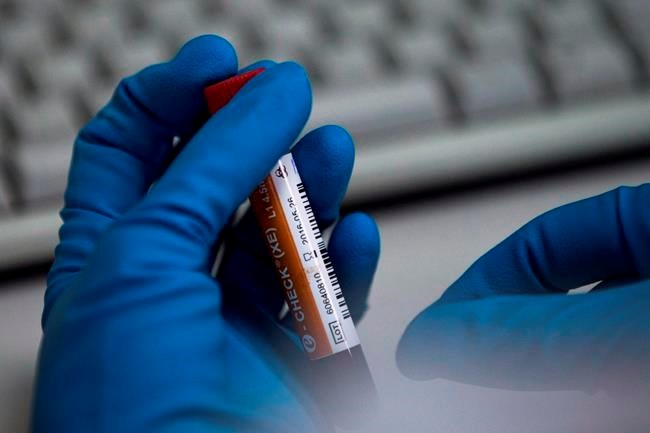Athletes, investigators, anti-doping officials and national sport committees all knew that the Russian Anti-Doping Agency's reinstatement from a doping scandal suspension was likely coming.
It didn't make Thursday's announcement formalizing the plan any easier to take.
The World Anti-Doping Agency's executive committee decided to reinstate the testing program after backtracking on two key conditions: that Russia accept a report that concluded state involvement in the doping and
Canada's Beckie Scott resigned her position on WADA's compliance review committee after it recommended the RUSADA reinstatement last week. She said Thursday's decision "wasn't a big surprise but nevertheless it was disappointing beyond measure."
"Athletes are held accountable, strictly liable, for breaking the rules," she told The Canadian Press from Addis Ababa, Ethiopia. "The whole reason for being of WADA is to protect clean athletes and to ensure their rights are upheld and to harmonize the global fight against doping in sport.
"And so one would expect that they would hold signatories to a very high standard. We feel that this was a compromise. It's very hard to accept."
RUSADA was suspended in November 2015 after the scandal — which
The reinstatement sparked sharp criticism across Canada and around the world. The head of the Canadian Centre for Ethics in Sport said he was "dismayed and disappointed" at the WADA decision.
"WADA is effectively thumbing their nose at the clean athletes," CCES president and chief executive officer Paul Melia said from Ottawa.
Canadian lawyer and investigator Richard McLaren issued the damning report for WADA that concluded there was widespread, state-sanctioned doping among Russian athletes. Reached Thursday in Lausanne, Switzerland, McLaren said his report still stands.
"Nobody has ever been able to say that this didn't occur," said McLaren, a Western University law professor. "Just because you deny, deny and deny, doesn't mean that it didn't occur. It just means that you're not prepared to say that it did. You're not prepared to admit it."
President of the Canadian Olympic Committee Tricia Smith called for a "detailed rationale" for WADA's decision in a statement released by the COC.
"If this decision stands, it is imperative that WADA publish a clear roadmap including a definition of the "strict conditions" and "agreed process" referenced in their announcement as well as definite timelines, means of enforcement, and a regular reporting mechanism," Smith said.
Several Canadian athletes voiced their displeasure with the WADA decision via social media.
"It's a sad day for athletes who believe in and live by the clean sport philosophy," bobsledder Jesse Lumsden said in an email. "I could go on but what's the point."
The Canadian Olympic Committee and the Canadian Paralympic Committee were expected to issue statements later Thursday.
"I really doubt the Russians will, overnight, start working against doping and accept recognized standards," said Christiane Ayotte, the director of the WADA-accredited laboratory in Montreal. "I will never have confidence that the Russians will have completely changed their cheating ways. Even if they have set up a laboratory in a university, the lab needs to be under trusteeship.
"I am going to try, as best I can, to make sure nobody helps them become once again the cheats they used to be."
Russia's Olympic committee was brought back into the fold after the Pyeongchang Olympics last February in South Korea. Athletes who could prove they were clean were able to compete at the Games as "Olympic Athletes from Russia."
"I think that it absolutely is wrong for (WADA) to reinstate them without having gone through the process that they were supposed to go through," Canadian curler Chelsea Carey said from Calgary. "Even then, I'm not sure that it was enough. I think it's atrocious but unfortunately I'm not terribly surprised."
In Pyeongchang, Russian curler Alexander Krushelnitsky tested positive for the banned substance meldonium, which is believed to help blood circulation. He gave his medal back after winning mixed doubles bronze with his wife, Anastasia Bryzgalova.
Canada, which won gold in the mixed doubles curling, was third in the medal standings in Pyeongchang with 29 medals (11 gold, eight silver and 10 bronze), finishing behind Norway (39) and Germany (31).
Olympic Athletes from Russia and host South Korea were tied for sixth place overall with 17 medals.
"Obviously Russia and the IOC have convinced WADA to change their mind on the roadmap and those criteria, so it proves that WADA is not able to act independently," Melia said. "It means that going forward the clean athletes, the anti-doping agencies, the governments of the world have to demand a reform to the governing structure of WADA because that executive committee is just a puppet of the IOC.
"That has to change going forward or we really don't have an effective international regulator for the code."
As for next steps, Russia has agreed to hand over samples and data by Dec. 31. If it doesn't, RUSADA will again be declared noncompliant.
"There's a lot of credibility on the line here," said Scott, who still leads the WADA athletes' group. "So I think a lot of people are going to be waiting and watching very closely what happens from here."
———
With files from The Associated Press and Canadian Press reporter Fred Daigle in Montreal.
Follow @GregoryStrongCP on Twitter.
Gregory Strong, The Canadian Press


